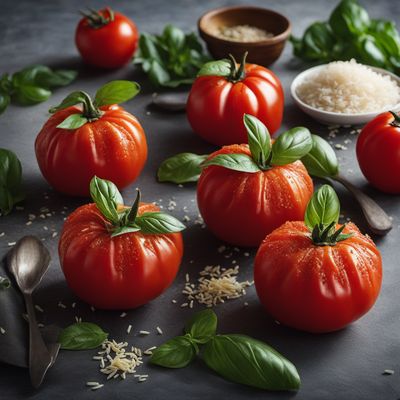
Recipe
Pisarei e fasò - Inca Style
Andean Delight: Inca-Inspired Pisarei e fasò
4.5 out of 5
Indulge in the flavors of the ancient Inca civilization with this unique twist on the classic Italian dish, Pisarei e fasò. This Inca-inspired recipe combines traditional Italian ingredients with the vibrant flavors and ingredients of Inca cuisine.
Metadata
Preparation time
30 minutes
Cooking time
25 minutes
Total time
55 minutes
Yields
4 servings
Preparation difficulty
Medium
Suitable for
Vegetarian, Vegan, Gluten-free, Dairy-free, Nut-free
Allergens
N/A
Not suitable for
Paleo, Keto, Low-carb, High-protein, Atkins
Ingredients
In this Inca-inspired version of Pisarei e fasò, we substitute the traditional wheat flour with a mixture of cornmeal and quinoa flour to give the dumplings an Andean twist. Additionally, we enhance the flavors of the bean stew by incorporating traditional Inca herbs and spices, such as aji amarillo (yellow chili pepper) and huacatay (Peruvian black mint). These changes infuse the dish with the unique flavors and characteristics of Inca cuisine. We alse have the original recipe for Pisarei e fasò, so you can check it out.
-
For the dumplings: For the dumplings:
-
1 cup (150g) cornmeal 1 cup (150g) cornmeal
-
1 cup (120g) quinoa flour 1 cup (120g) quinoa flour
-
1/2 teaspoon salt 1/2 teaspoon salt
-
1/2 cup (120ml) water 1/2 cup (120ml) water
-
For the bean stew: For the bean stew:
-
2 cups (400g) cooked white beans 2 cups (400g) cooked white beans
-
1 onion, finely chopped 1 onion, finely chopped
-
2 cloves garlic, minced 2 cloves garlic, minced
-
1 tablespoon vegetable oil 1 tablespoon vegetable oil
-
1 tablespoon aji amarillo paste (or substitute with yellow chili powder) 1 tablespoon aji amarillo paste (or substitute with yellow chili powder)
-
1 teaspoon ground cumin 1 teaspoon ground cumin
-
1 teaspoon dried oregano 1 teaspoon dried oregano
-
1/2 cup (120ml) vegetable broth 1/2 cup (120ml) vegetable broth
-
Salt and pepper to taste Salt and pepper to taste
-
Fresh huacatay leaves for garnish (optional) Fresh huacatay leaves for garnish (optional)
Nutrition
- Calories (kcal / KJ): 350 kcal / 1465 KJ
- Fat (total, saturated): 5g, 0.5g
- Carbohydrates (total, sugars): 65g, 5g
- Protein: 12g
- Fiber: 10g
- Salt: 1g
Preparation
-
1.In a large bowl, combine the cornmeal, quinoa flour, and salt for the dumplings. Gradually add water and knead until a smooth dough forms. Let it rest for 10 minutes.
-
2.Meanwhile, in a large pot, heat the vegetable oil over medium heat. Add the chopped onion and minced garlic, and sauté until translucent.
-
3.Stir in the aji amarillo paste, ground cumin, and dried oregano, and cook for another minute to release the flavors.
-
4.Add the cooked white beans and vegetable broth to the pot. Bring to a simmer and let it cook for 10-15 minutes, allowing the flavors to meld together. Season with salt and pepper to taste.
-
5.While the bean stew is simmering, shape the dough into small dumplings, about the size of marbles.
-
6.Gently drop the dumplings into the simmering bean stew and cook for 10-12 minutes, or until the dumplings are cooked through and tender.
-
7.Serve the Inca-style Pisarei e fasò hot, garnished with fresh huacatay leaves if desired.
Treat your ingredients with care...
- Cornmeal — Make sure to use fine cornmeal for a smoother texture in the dumplings.
- Quinoa flour — If you can't find quinoa flour, you can grind quinoa seeds in a blender or food processor until fine.
- Aji amarillo paste — Aji amarillo is a Peruvian yellow chili pepper. If you can't find the paste, you can substitute it with yellow chili powder for a similar flavor.
Tips & Tricks
- For a spicier version, add more aji amarillo paste or sprinkle some crushed red pepper flakes.
- If the dough for the dumplings is too dry, add a little more water. If it's too sticky, add a bit more cornmeal.
- To save time, you can use canned white beans instead of cooking them from scratch. Just make sure to rinse them well before using.
Serving advice
Serve the Inca-style Pisarei e fasò as a main course, accompanied by a fresh salad or steamed vegetables. It pairs well with a side of quinoa or rice to complete the meal.
Presentation advice
To enhance the presentation, arrange the dumplings and bean stew in a shallow bowl, garnish with fresh huacatay leaves, and drizzle with a touch of olive oil.
More recipes...
More Italian cuisine dishes » Browse all

Trippa alla Pisana
Pisa-style tripe
Trippa alla Pisana is a traditional dish from the Italian city of Pisa. It is a hearty and flavorful stew made with tripe, tomatoes, onions,...

Ciambella all'anice di Veroli
Ciambella all'anice di Veroli is a traditional Italian cake that is flavored with anise. It is a popular dessert in the Lazio region of Italy and...

Zingara di Ischia
Veal and pepper sandwich
Zingara di Ischia is a traditional sandwich from the Ischia island of Italy. It is made with a round, flatbread that is stuffed with various fillings.








